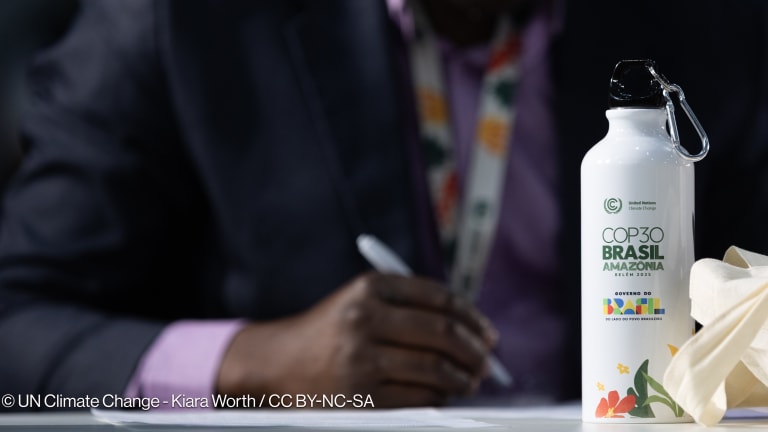
The blue economy is one buzzword popping up at the United Nations Ocean Conference as delegates seek to harness the world’s water resources in sustainable ways to boost development.
The meeting in New York is the first the U.N. has hosted specifically on just one of the 17 wide-reaching Sustainable Development Goals. The focus is on SDG 14 (conserving and sustainably using oceans, seas and marine sources), marking a “testing for the principle of multilateralism,” U.N. Secretary-General António Guterres said during his opening remarks yesterday.
“Conserving our oceans and using them sustainably is preserving life itself,” he said.
Fish, finance and Trump: What to expect at the UN Ocean Conference
The first United Nations-hosted conference on the world's oceans is expected to convene more than 5,000 participants to attend panel discussions and commit action on ocean and marine sustainability.
Part of that means eliminating illegal tuna fishing, as 48 businesses and fishing companies pledged yesterday with the Tuna 2020 Traceability Declaration.
Another element is sustainably developing ocean resources, says Dessima Williams, the U.N.’s special adviser for the implementation of the SDGs and Grenada’s former ambassador to the U.N.
Devex caught up with Williams to talk about what it means to develop a blue economy, and what economic opportunities can be found within our oceans. Below are highlights from the conversation, edited for length and clarity.
The blue economy can mean different things to different people. What does this mean to you?
It is an opportunity to harness the resources of the ocean in a way that benefits the world. And in some senses, I think the blue economy is a bit narrow because it pretends to look at an economic role for the oceans only, whereas it is part of the [wider] sustainable shift that is we have to do. We have to relate to the ocean in an economic role, an environmental, sustainable way.
We have to clean up all the pollution. But also we have to make sure the benefits of the ocean are more broadly shared. That is quite important for islands, because oceans are their front yards and their back yards. Benefits that have come to them from the oceans have not been commensurate with the scale at which economic resources are taken from the oceans, or the level of ownership the islands can or should exercise over the oceans. So, the blue economy is particularly useful for the small island states because they are theirs.
Actually, the oceans belong to nobody. They belong to humanity. But the fact that the small island states live vigorously and fiercely and primarily with the oceans means they have some sort of front row seat to discussions, activities and benefits. Small states have to be the frontline of the leadership transitioning from an economy that is much more based on the land, to an economy that is much more based on the oceans and that is democratically governed, in an economic sense.
Are you seeing this in programs for economic development, or livelihood, that they have not been as centered as they should be on the capacity of the oceans and what growth they could bring?
It is coming along. But I think that there is a long way to go. Take tuna and the Pacific Ocean: that has been an area of great difficulty, if not done right in justice. And now I think there is more benefit sharing between the Pacific economy and the multinationals who are involved in that.
What are you hoping will come out of this conference that can jumpstart work on the blue economy?
There are many levels. First, this great global awareness, that what we are doing is shooting ourselves in the foot in terms of destroying the health and wealth of the ocean. Out of that there’s a broadening of consciousness and awareness. The call for action, the partnerships and the voluntary commitments will all lead toward a critical, global coalescing of action. I think we can see out of this five days a real appreciation for the ocean as something of great value, not just to reap and to raid and to dump in — but something to protect: around climate change, around fishing, around jobs.
Around the world there are many initiatives and the conference will try to harmonize some of that. We won't get everything done in one week, but we can go very, very far down the road.
This is the first conference on any single SDG the U.N. has hosted so far. Is the idea to highlight different SDGs moving forward?
Every year we have to report on the SDGs and in that sense we will have a focus on one or several of the goals. The conferences depend on the specific resolutions that were passed, so I don’t know. We know there has got to be a big meeting on financing down the road. It might catch on fire having a global focus per goal, and it might actually be a way to fast track this potential response. This can galvanize global interest.
Read more international development news online, and subscribe to The Development Newswire to receive the latest from the world’s leading donors and decision-makers — emailed to you free every business day.








